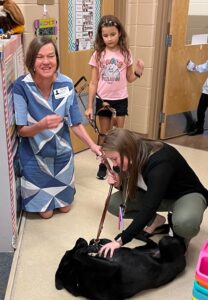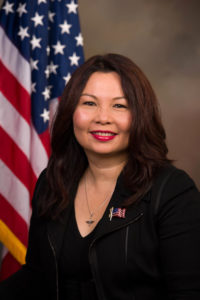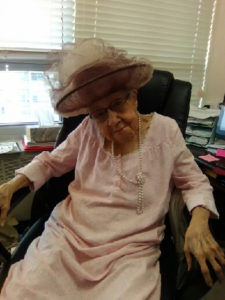Senior Class: Sharon’s New State of Mind
November 25, 2022 • 14 Comments • Posted in guest blog, memoir writing, public speaking, teaching memoirA number of writers from Wanda Bridgeforth’s memoir-writing class came to her memorial service last Saturday. Sharon Kramer was one of them, and she graciously agreed to let me publish this essay she wrote about the event. Mike, Seeing Eye dog Luna, and I were there, too. What an honor to meet — and celebrate Wanda’s well-lived life with — some of the family members and friends Wanda has written about in the many, many years she attended our class. Thanks to Sharon for writing all about it here:
A Wanda State of Mind
by Sharon Kramer

That’s Sharon Kramer to my left and three other writers from our downtown class back in 2016: Audrey Mitchell, Wanda Bridgeforth, and Darlene Schweitzer.
Funerals are not to be enjoyed. They are an obligation, something to be endured. Sort of like death itself.
Not only are funerals sad and dark, but they are often insincere, too. Sometimes the minister has never even met the deceased and calls her “Beatrice” when all of her friends knew her as “Bea.” I even witnessed a rabbi who forgot the name of the departed.
Last Saturday, I attended the funeral of Wanda Bridgeforth. It wasn’t dark at all. In fact, if I could choose a color, I would say it was pink. There were old friends to greet — some I hadn’t seen in person for two years — and even though it was one of Chicago’s coldest days, the mood was upbeat.
The three people who spoke at the presentation knew of Wanda’s lust for life and told stories about her joy in being alive. Her Godson, Alex, spoke about Wanda’s love for animals. “When I was a boy, Wanda was the only adult I ever saw kiss a dog,” he said. “And on the lips!” While other adults grimaced at the sight, Alex forever after loved his Godmother for that tender — and possibly sloppy — act. When he graduated from college, Wanda gave him a copy of “Oh the places you’ll go,” by Dr. Seuss, as a gift. Later on, when he graduated from Northwestern law school, people gave him expensive pens, wallets and briefcases. “And Wanda? She wrote me a poem.” He has no idea where those briefcases and other things are now, but he treasures that poem from Wanda and knows exactly where it is.
Wanda’s daughter, Wanda Jr,. told us how fortunate she was to be raised by Wanda. Other kids grew up with parents who scolded them if they did something wrong. But not Wanda. She looked at wrongdoing as an opportunity to give her daughter advice. A story Junior shared about walking home from school when she was ten years old and picking lilacs off a neighbor’s bush along the way tells all. When Junior brought those flowers home to her Mama and gushed about how good they smelled and how beautiful they were, Wanda used a soft voice to ask her daughter a question. “You always like smelling those lilacs when you pass by that bush, don’t you?” Ten-year-old Junior answered enthusiastically. “Oh, yes, Mama, I really do!”
“I imagine other people think they are beautiful too,” her Mama pointed out.
“They sure do, Mama!”Junior replied.
“But they leave them there for all to enjoy,” Wanda concluded.
Lesson learned. Junior went back to apologize to the neighbor who had the lilac bush in her yard, and all was forgiven.
Beth, Wanda’s friend and teacher, spoke directly to Wanda instead of the congregation. I could see Wanda smiling about this: an irreverence Wanda would have loved.
Wanda had been in Beth’s writing class almost from the start — for 15 years — and sat next to Beth at every class. That way Beth could easily hear Wanda, and Wanda, who had a hearing problem, could hear Beth. A wonderful coupling, and as Wanda famously said many times, it was “the deaf leading the blind.”
Leaving the funeral, I felt uplifted instead of sad. How lucky I was to know Wanda and get a glimpse of her amazing life. A pink life. A life full of love, humor and wisdom.
Today as I write this, I am still in a “Wanda” state of mind. Despite my preconceived ideas of funerals, this one was to be enjoyed, just like Wanda.



